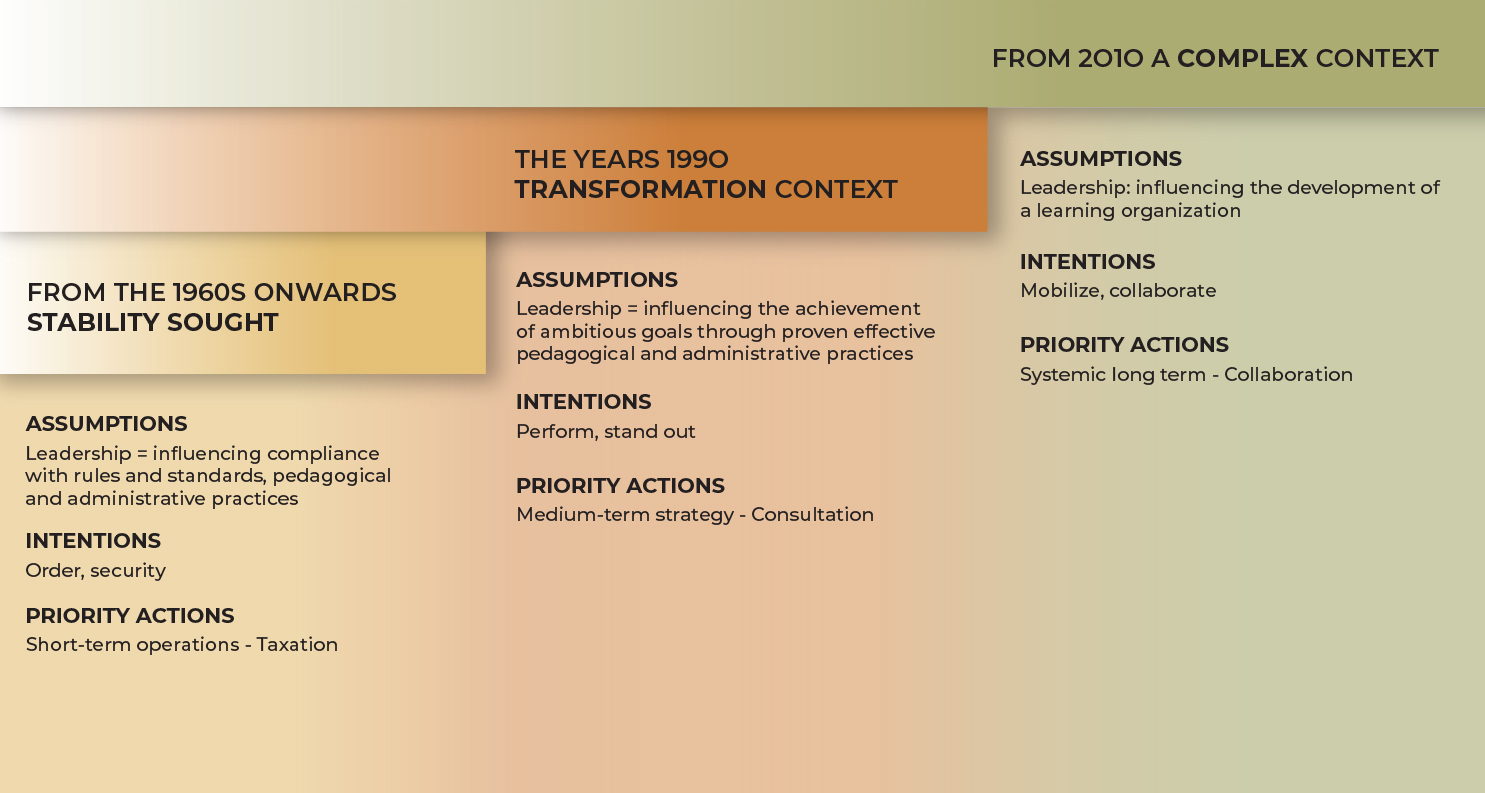An assumption is a referent describing what a person or group of people believe to be true. It makes explicit their beliefs, their values and their theories which inspire their actions. In the following lines, we present our assumptions on leadership.
2.1 The evolution of leadership assumptions in education
The Indo-European root of the word “leadership”, leith, means “to go forward”. A leader or group of leaders has the ability to lead by example, to follow through, to influence and to create a world to which others want to belong.
The Association des directions générales des commissions scolaires du Québec (ADIGECS), now known as the Association des directions générales scolaires (ADGSQ), was founded in 1972 (Moisset and Plante, 2004). Since then, the leadership of its members has long been seen as a capacity to influence, through sustained attention to the observance of rules and standards, the practices of the company’s management and administrative roles within a school organization, according to an established organizational chart and hierarchical roles. From this perspective, leadership has often been seen as an individual skill of general management.
At the turn of the 1990s, the advent of collective concerns related to the optimization of processes and resources in companies and educational organizations led to a shift in the meaning given to leadership. The notions of accountability and responsibility now permeate the Public Administration Act and the Education Act. public education in Quebec. They give rise to educational projects, agreements and strategic plans underpinned by organizational analyses and indicators. General management’s leadership is seen as a capacity to influence through sustained attention to compliance with rules and standards, as well as the achievement of ambitious objectives through the implementation of research-proven teaching and administrative practices within the organization. Leadership has often been described in terms of the individual skills of top management.
Over the past decade, the meaning of leadership has broadened once again. Faced with numerous challenges in the heart of an increasingly complex environment, DGs have perceived and experienced, notably through the CAR movement (ADIGECS, Fondation Lucie et André Chagnon and CTREQ, nd), the value of collaboration amongst themselves, within their respective organizations and with other stakeholders in Quebec education. In this sense, leadership is still seen as the ability of a leader or a group of leaders who influence, through sustained attention to comply to rules and standards, and to achieve ambitious goals through the implementation of pedagogical and administrative practices proven to be effective by research. Nowadays, however, it is seen just as much as the ability to steer coherent development of the interdependent units of a school service center or school board, with internal and external stakeholders at regional and national levels, on the basis of conscious intentions, actions and assumptions adjusted to the context. In this way, a school service center or school board, as a learning organization, can fulfill its mission in terms of educational success. From this perspective, the leadership of DGs is now seen in terms of competent, conscious, individual and collective professional actions.
Table 1 summarizes the gradual broadening of executive leadership perspectives over the last few decades.

TABLE 1: Progressive broadening of the perspectives of top management leadership over the last few decades.
DG leadership is considered here as a competent and conscious professional action, both individual and collective. A director general, like the community of DGs, can implement priority actions most likely to influence a significant transformation of its organization’s context, based on conscious and explicitintentions and assumptions. Individually and collectively, the better we can read our context and design the competent actions needed and to be taken, who are inspired by conscious and explicit intentions and assumptions, the more we will be able to inspire competent and innovative actions from all of Quebec’s educational leaders, based on conscious, explicit intentions and assumptions, for them too. Figure 1 on the following page summarizes this idea. In this way, we will contribute to the deployment of learning organizations that are essential to a strong education system in Quebec, i.e. organizations who’s systemic and differentiate educational and management actions, support the individual and collective development of people by, for and with them and, by the same token, organizational development.
Considered in this way as a competent and conscious professional action, both individual and collective, the leadership DGs can be echoed in constructivist-developmental leadership theories5. These theories are constructivist in the sense that they describe how senior managers have progressively constructed and enriched the meaning of their leadership experience over time, as shown in Table 1 on the previous page. They are developpemental in the sense that they describe the gradual broadening of executive management’s preoccupations with leadership, and their growing ability to manage complexity within and around themselves, as shown in the table below.
1. From this perspective, leadership is not a characteristic, disposition, personality, skill or style. It is a way of being, doing and thinking, that a leader or a group of leaders develops and modulates itself according to context and individual and collective intentions and assumptions. In this sense, this perspective on leadership honors the various forms of leadership and the contributions of different leadership theories.
In this frame of reference, our perspective on leadership as competent and conscious professional action, inspired by constructivist- developmental theories, explains our concern to make explicit, in the preceding lines, our assumptions regarding leadership and, in the following lines, our vision of the current context of practice, our priority intentions and the actions we consider essential to work, individually and collectively, in education in Quebec.
